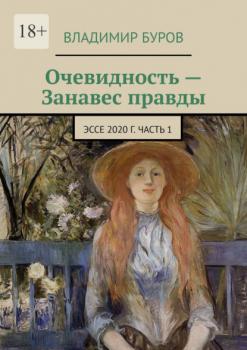Философия
Различные книги в жанре ФилософияОчевидность – Занавес правды. Эссе 2020 г. Часть 1
На СЦЕНЕ и только на ней происходят все невидимые для Непосвященных события, – как-то – еще до Чехова и Шекспира: – Пенелопа мрачно бродит, как тень Отца Гамлета, – но: – Только в воображении тех, кто еще до сих пор не знает, что параллельно почти своему замужеству за Одиссеем очень далеким: – Владеет своим личным публичным домиком, где собрались люди, его посещающие, – тоже: – С соображением, что можно: – Не только мечтать, но даже на самом деле думать о красе ногтей.
Размышления о природе вещей и идей
Попытки представить себе целостную картину мира приводят к формированию мировоззрения. Эти попытки автор отобразил в цикле научно-популярных статей, которые были написаны в разное время. Тематика статей весьма разнообразна: история естествознания, современная научная картина природы или общефилософские эссе. Многие статьи неоднократно перерабатывались. Некоторые публиковались ранее в сетевом альманахе «Лебедь», другие публикуются впервые. Книга предназначена для широкого круга читателей.
БАҚЫТТЫ БОЛУДЫ ҮЙРЕНІҢІЗ 3 БӨЛІМ Миды қозғайтын идеялар!
Күнделікті газеттер беттерінен (менің ойымша газет оқитындар әлі бар), кинотеатрлар мен теледидар экранынан, кітаптар мен көшедегі жарнамадан, интернеттен, әлеуметтік желілерден біз басқа адамдардың дауыстарын естиміз, олар бізге не ойлау керектігін айтады, бізге қалай өмір сүру керектігін және неге сену керектігін түсіндіреді. Cол себепті бәріміз попугайға айналдық. Мен жазған идеяларды оқыңыз және олардың пайдасын өз тәжірибеңізде сынап көріңіз. Идеяларды аямай сынаңыз. Себебі мен сіздердің попугай болғандарыңызды қаламаймын!
The Republic
Contains Active Table of Contents (HTML) and in the end of book include a bonus link to the free audiobook. Often ranked as the greatest of Plato's many remarkable writings, this celebrated philosophical work of the fourth century B.C. contemplates the elements of an ideal state, serving as the forerunner for such other classics of political thought as Cicero's De Republica, St. Augustine's City of God, and Thomas More's Utopia. Written in the form of a dialog in which Socrates questions his students and fellow citizens, The Republic concerns itself chiefly with the question, «What is justice?» as well as Plato's theory of ideas and his conception of the philosopher's role in society. To explore the latter, he invents the allegory of the cave to illustrate his notion that ordinary men are like prisoners in a cave, observing only the shadows of things, while philosophers are those who venture outside the cave and see things as they really are, and whose task it is to return to the cave and tell the truth about what they have seen. This dynamic metaphor expresses at once the eternal conflict between the world of the senses (the cave) and the world of ideas (the world outside the cave), and the philosopher's role as mediator between the two. High school and college students, as well as lovers of classical literature and philosophy, will welcome this handsome and inexpensive edition of an immortal work. It appears here in the fine translation by the English classicist Benjamin Jowett.
El niño de guerra
Obra sobre un joven adolescente que no acepta la guerra y no se cree lo que está pasando. Esto le hace madurar muy rápido. Al estallar la guerra en su ciudad está obligado a salir de allí antes de que lo cogieran los militares serbios y le mandasen al frente a luchar contra su pueblo. El niño de guerra huye de su ciudad con otros tres amigos que le acompañan en la aventura de llegar a la zona libre y cruzar la frontera de Bosnia para llegar a Croacia, y para más tarde ir a casa de su tío en Eslovenia.
Extraordinary Life of Great Slave Harriet Jacobs
Harriet Jacobs (1813 or 1815 March 7, 1897) was an African American lady born into bondage in Edenton, North Carolina, who was sexually harassed by her enslaver. When he threatened to sell her children if she did not submit to his lust, she hid in an extremely small crawl space under the roof of her grandma's house, so deep that she could not get up in it. After remaining there for 7 years, she finally managed to run away to the Free North, where she was reunited with her children Louisa Matilda and Joseph and her brother John S. Jacobs. She found work as a nanny and came into contact with abolitionists and feminist reformers. Even in New York, her freedom was in jeopardy until her employer could pay off her rightful owner.During and immediately after the Civil War, she, along with her daughter, went to the Union-occupied parts of the South, organized aid, and founded two schools for fugitives and freed slaves.Brief SummaryAfter seven years in the attic, Harriet finally flees by boat to the north. Benny's stopover with Aunt Martha & Harriet is reunited with Ellen, who is now nine years old and lives in Brooklyn, New York. Harriet is dismayed that her girl is still being held in virtual bondage by Mr. Sand's cousin Mrs. Hobbs. She fears that Mrs. Hobbs will return Ellen to the South, putting her forever out of Harriet's reach. She finds work as a nanny for a New York family, the Bruces, who treat her very kindly. Dr. Flint continues to pursue Harriet and she flees to Boston. There she is reunited with Benny. Dr. Flint now claims that the sale of Benny and Ellen was Invalid, and Harriet is afraid that he will enslave them all again. After a few years, Mrs. Bruce dies, and Harriet spends some time with her children in Boston. She allocates a year in England caring for Mr. Bruce's girl, and for the first time in her life, she appreciates immunity from racial bias. When Harriet came back to Boston, Ellen goes to boarding school and Benny has shifted to California with Harriet's brother William. Mr. Bruce remarries, and Harriet takes a position caring for her new baby. Dr. Flint dies, but his daughter Emily writes to Harriet to claim ownership of her. The outlaw Slave Act is passed by Congress, making Harriet extremely vulnerable to re-enslavement and kidnapping.Emily Flint and her husband, Mr. Dodge, reach New York to grab Harriet. Harriet hides, and the new Mrs. Bruce offers to buy her freedom. Harriet declined to be bought and sold one more time and plans to follow Benny to California. Mrs. Bruce buys Harriet anyway. Harriet is devastated to be sold and angry at Emily Flint and the whole slave system.Note:– We are offering this book at a 90% discount as a promotional activity.
La extraordinaria vida de la gran esclava Harriet Jacobs
Harriet Jacobs (1813 o 1815 7 de marzo de 1897) fue una mujer afroamericana nacida en la esclavitud en Edenton, Carolina del Norte, que fue acosada sexualmente por su esclavista. Cuando amenazó con vender a sus hijos si ella no se sometía a su lujuria, se escondió en un espacio extremadamente pequeño bajo el techo de la casa de su abuela, tan profundo que no podía levantarse en él. Después de permanecer allí durante 7 años, finalmente logró huir al Norte Libre, donde se reunió con sus hijos Louisa Matilda y Joseph y su hermano John S. Jacobs. Encontró trabajo como niñera y entró en contacto con abolicionistas y reformistas feministas. Incluso en Nueva York, su libertad estaba en peligro hasta que su empleador pudiera pagar a su legítimo propietario.Durante e inmediatamente después de la Guerra Civil, ella, junto con su hija, fue a las partes del Sur ocupadas por la Unión, organizó ayuda y fundó dos escuelas para fugitivos y esclavos liberados.Breve ResumenDespués de siete años en el ático, Harriet finalmente huye en barco hacia el norte. La parada de Benny con la tía Martha y Harriet se reúne con Ellen, que ahora tiene nueve años y vive en Brooklyn, Nueva York. Harriet está consternada de que su chica todavía está siendo mantenida en esclavitud virtual por la prima del Sr. Sand, la Sra. Hobbs. Ella teme que la señora Hobbs devuelva a Ellen al Sur, poniéndola para siempre fuera del alcance de Harriet. Ella encuentra trabajo como niñera para una familia de Nueva York, los Bruces, que la tratan muy amablemente. El Dr. Flint continúa persiguiendo a Harriet y ella huye a Boston. Allí se reúne con Benny. Dr. Flint ahora afirma que la venta de Benny y Ellen no era válida, y Harriet tiene miedo de esclavizarlos a todos de nuevo. Después de unos años, la señora Bruce muere, y Harriet pasa algún tiempo con sus hijos en Boston. Asigna un año en Inglaterra cuidando a la niña del Sr. Bruce, y por primera vez en su vida, aprecia la inmunidad contra los prejuicios raciales. Cuando Harriet regresó a Boston, Ellen va a un internado y Benny se ha mudado a California con el hermano de Harriet, William. El Sr. Bruce se vuelve a casar, y Harriet toma una posición cuidando a su nuevo bebé. Dr. Flint muere, pero su hija Emily escribe a Harriet para reclamar la propiedad de ella. La Ley de Esclavos fuera de la Ley es aprobada por el Congreso, lo que hace que Harriet sea extremadamente vulnerable a la re-esclavitud y el secuestro.Emily Flint y su esposo, el Sr. Dodge, llegan a Nueva York para agarrar a Harriet. Harriet se esconde, y la nueva señora Bruce ofrece comprar su libertad. Harriet se negó a ser comprado y vendido una vez más y planea seguir a Benny a California. La Sra. Bruce compra a Harriet de todos modos. Harriet está devastada por ser vendida y enojada con Emily Flint y todo el sistema de esclavos.Nota: – Ofrecemos este libro con un descuento del 90% como actividad promocional.
Мир рациональных людей
Василий Александрович Сухоставцев
Многие тысячелетия назад человек начал заниматься сельским хозяйством, ремеслом, торговлей. При этом каждый человек в благоприятной обстановке вполне мог обеспечить себя и свою семью едой, одеждой, необходимыми в обиходе изделиями. С тех пор производительность труда выросла в несчетное число раз. Следовало бы ожидать, что для обеспечения себя всем необходимым каждому человеку нужно будет все меньше и меньше работать. На практике этого не происходит. Почему? Возможно, наше общество устроено нерационально? А как должно быть устроено рациональное общество? Автор находит ответы на эти вопросы и предлагает свой рецепт. Для того чтобы общество стало рациональным, нужно изменить не так уж много. Книга написана для тух, кто интересующиеся устройством общества, экономикой, для идеалистов, мечтающие о более справедливом и богатом мире, для политиков, испытывающих дефицит идей.









